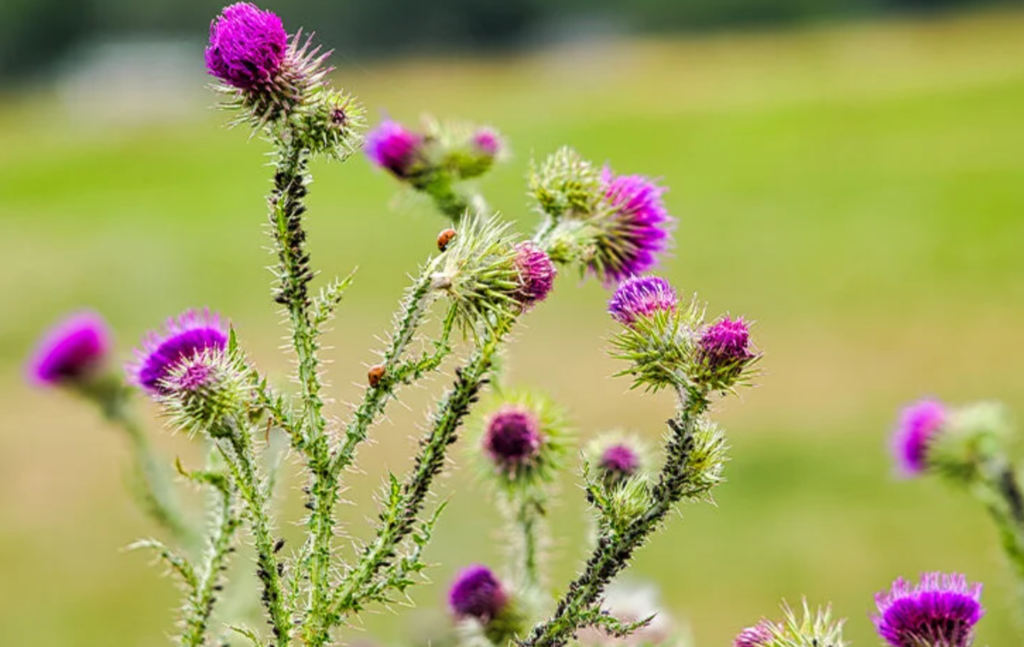What is Milk Thistle?
The scientific name for milk thistle is Silybum marianum, and it is also known by other names such as holy thistle, Mary thistle, and St. Mary’s thistle.
Milk thistle contains a powerful antioxidant called silymarin, which is believed to have liver-protective effects. Silymarin is thought to help the liver repair damaged cells and regenerate new ones. It is also believed to have anti-inflammatory properties and may help reduce inflammation in the liver.
Milk thistle is commonly used as a natural remedy for liver problems such as cirrhosis, hepatitis, and fatty liver disease. It is also used to help protect the liver from damage caused by alcohol, toxins, and other substances.
Milk Thistle History
Milk thistle has a long history of use as a medicinal herb. Its use can be traced back to ancient Greece and Rome, where it was used to treat liver and gallbladder problems. The plant was also used by traditional herbalists in other parts of Europe for various ailments such as jaundice, spleen and kidney problems, and even snakebites.
In the Middle Ages, milk thistle was believed to have strong protective and healing properties and was used to treat a range of diseases, including bubonic plague. The plant was also a popular ingredient in traditional European herbal remedies.
Milk thistle was introduced to North America by European settlers in the 17th century, and it quickly became a popular medicinal herb among Native American tribes. The plant was used to treat a variety of ailments, including liver and kidney problems, as well as skin conditions and snakebites.
In the 20th century, milk thistle gained popularity as a natural remedy for liver problems. The active ingredient silymarin was isolated and studied for its liver-protective effects, and it is now widely used as a dietary supplement to support liver health.
Overall, milk thistle has a rich history of use as a medicinal herb, and its therapeutic properties continue to be studied and explored today.
Pros:
- Liver health: Milk thistle is believed to have liver-protective effects and may help prevent and treat liver damage caused by alcohol, toxins, and other substances.
- Antioxidant properties: Milk thistle contains silymarin, a powerful antioxidant that may help protect against oxidative damage and inflammation in the body.
- Potential cancer-fighting properties: Some studies suggest that milk thistle may have anti-cancer properties, particularly in the treatment of liver and breast cancers.
- Easy to find and use: Milk thistle is widely available in various forms, including capsules, teas, and extracts, and is generally considered safe for most people.
Cons:
- Limited scientific evidence: While there is some evidence to support the use of milk thistle for liver health and other conditions, more research is needed to fully understand its benefits and potential side effects.
- Possible side effects: Milk thistle is generally considered safe, but some people may experience side effects such as indigestion, nausea, and diarrhea.
- Interactions with medications: Milk thistle may interact with certain medications, including some statins, blood thinners, and anti-anxiety drugs, so it’s important to talk to a healthcare provider before taking milk thistle if you are taking any medications.
- Not a substitute for medical care: Milk thistle should not be used as a substitute for medical care or treatment, and individuals with liver or other health conditions should always seek the advice of a healthcare provider before using any natural remedies or supplements.
How to Identify Pure Milk Thistle Supplement?
When shopping for milk thistle supplements, it’s important to look for high-quality, pure products to ensure that you are getting the maximum benefits. Here are some tips on how to identify pure milk thistle supplements:
- Look for standardized extracts: Look for milk thistle supplements that contain standardized extracts, which means that the active ingredient, silymarin, is present in a consistent and reliable amount. Standardized extracts are typically labeled as “standardized to X% silymarin,” with X being the percentage of silymarin in the product.
- Check the ingredients: Make sure to read the ingredients label carefully to ensure that the supplement only contains milk thistle extract and doesn’t have any fillers, binders, or artificial additives.
- Check the source: Choose milk thistle supplements that are made from high-quality, organically grown milk thistle plants. Look for supplements that are sourced from reputable manufacturers who follow strict quality control standards.
- Check the dosage: Check the dosage instructions on the label to ensure that the supplement contains a sufficient amount of silymarin to be effective. The recommended dosage of milk thistle extract can vary depending on the form of the supplement, so make sure to follow the instructions carefully.
- Look for third-party testing: Choose milk thistle supplements that have been third-party tested for purity and potency. This can help ensure that the product is free from contaminants and contains the amount of active ingredient listed on the label.
Overall, choosing a high-quality, pure milk thistle supplement can help ensure that you are getting the maximum health benefits from this natural remedy. As always, it’s important to talk to a healthcare provider before taking any new supplements, especially if you have a medical condition or are taking other medications.

